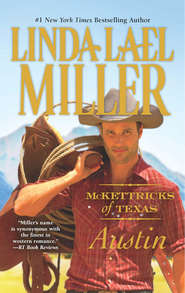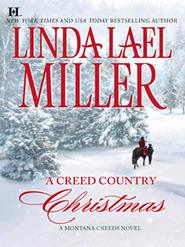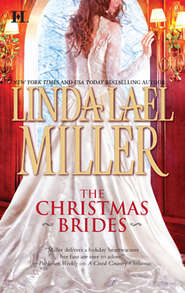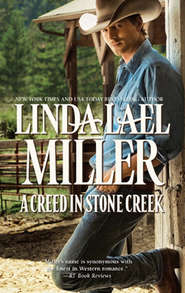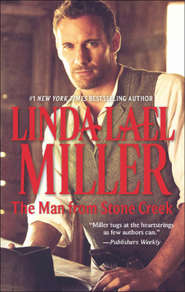По всем вопросам обращайтесь на: info@litportal.ru
(©) 2003-2024.
✖
A McKettrick Christmas
Автор
Год написания книги
2019
Настройки чтения
Размер шрифта
Высота строк
Поля
Slowly, tentatively, the others joined in.
Chapter Two
Morgan hadn’t intended to wander far from the train—he’d meant to keep the lantern-light from the windows in view—but the storm was worse than he’d thought. Cursing himself for a fool, his own lantern having guttered and subsequently been tossed aside, he stood with the howling wind stinging his ears, bare hands shoved into the pockets of his inadequate coat. It was as though a veil had descended; he not only couldn’t see the glow of the lamps, he couldn’t see the train. All sense of direction deserted him—he might be a step from toppling over the rim of the cliff.
Be rational, he told himself. Think.
For the briefest moment the wind collapsed to a whisper, as though drawing another breath to blow again, and he heard a faint sound, a snatch of singing.
He pressed toward it, blinded by the pelting snow, blinked to clear his eyes and glimpsed the light shining through the train windows. Seconds later he collided hard against the side of the railroad car. Feeling his way along it, grateful even for the scorching cold of bare metal under his palms, he found the door.
Stiff-handed, he managed to open it and veritably fall inside. He dropped to his knees, steadied himself by grasping the arm rest of the nearest seat. His lungs burned, and the numbness began to recede from his hands and feet and face, leaving intense pain in its wake.
Frostbite? Suppose he lost his fingers? What good was a doctor and sometime surgeon without fingers?
He hauled himself to his feet and found himself face-to-face with a wide-eyed Lizzie McKettrick. He could have tumbled into the blue of those eyes; it seemed fathomless. She draped something around him—a blanket or a quilt or perhaps a cloak—and boldly burrowed into his coat pocket, brought out the pint the peddler had given him earlier.
Pulling the cork, she raised the bottle to his lips and commanded, “Drink this!”
He managed a couple of fiery swallows, waved away the bottle. His vision began to clear, and the thrumming in his ears abated a little. With a chuckle he ran a shaky forearm across his mouth. “If you have any kindness in your soul,” he said laboriously, “you will not say ‘I told you so.’”
“Very well,” Lizzie replied briskly, “but I did tell you so, didn’t I?”
He laughed. Not that anything was funny. He’d seen little on his foray into the blizzard, but he had confirmed a few of his worst suspicions. The car was off the tracks, and tipping with dangerous delicacy away from the mountainside. And nobody, McKettrick or not, was going to get through that weather.
If any of them survived, it would be a true miracle.
Once Morgan stopped shivering, Lizzie returned the quilt to Mrs. Halifax and went forward again to sit with him. Whitley glared at her as she passed his seat.
She’d gotten used to wearing the conductor’s coat by then; even though it smelled of coal smoke and sweat, it was warm. She considered offering it to Morgan, but she knew he would refuse, so she didn’t make the gesture.
“I heard you singing,” Morgan said, somewhat distractedly, when she sat down beside him. “That’s how I found my way back. I heard you singing.”
Moved, Lizzie touched his hand tentatively, then covered it with her own. His skin felt like ice, and his clothes were damp. Once he dozed off, not that he was in any condition to stop her even then, she’d make her way back to the baggage car. Raid her trunks and crates, and Whitley’s, too, for dry garments. And the freight car might contain food, matches, even blankets.
Lizzie’s stomach rumbled. None of them had eaten since their brief stop in Flagstaff, hours before, and she’d picked at her leathery meat loaf and overcooked green beans. Left most of it behind. Now she would have devoured the sorry fare happily and ordered a cup of strong, steaming coffee.
Coffee.
Suddenly, she yearned for the stuff, generously laced with cream and sugar—and a good splash of brandy.
Morgan’s fingers curled around hers, squeezed lightly. “Lizzie?”
“I was just thinking of hot coffee,” she confessed, keeping her voice down, “and food. Do you suppose there might be food in the freight car?”
He grinned at her. “I watched you in the restaurant at the depot today,” he said. “You barely touched your meat loaf special.”
“You were watching me?” She found the idea at once disturbing and titillating.
“Hard not to,” Morgan said. “You’re a very good-looking woman, Lizzie. I did wonder, I confess, about your taste in traveling companions.”
Lizzie felt color warm her cheeks, and for once, she welcomed it. Every other part of her was cold. “You seem to have formed a very immediate, and very poor, impression of Mr. Carson.”
“I’m a good judge of character,” he replied. “Mr. Carson doesn’t seem to have one, as far as I’ve been able to discern.”
“How could you possibly have reached such a conclusion merely by looking at him in a busy train depot?”
“He didn’t pull back your chair for you when you sat down,” Morgan went on, his tone just shy of smug. “And you paid the bill. It only took a glance to see those things—I saved the active looking for you.”
“Mr. Carson,” Lizzie said, mildly mortified, “is making this journey as my guest. That’s why I paid for his meal. He is, I assure you, quite solvent.”
“Planning to parade him past the McKettricks?” Morgan teased, after a capitulating grin. “I’ve only met one of them—Kade—a few weeks ago, in Tucson. He told me Indian Rock needed a doctor and offered me an office in the Arizona Hotel and plenty of patients if I’d come and set up a practice. Didn’t strike me as the sort to be impressed by the likes of Mr. Carson.”
All kinds of protests were brewing in Lizzie’s bosom, but the mention of her uncle’s name stopped her as surely as the avalanche had stopped the train. Though she wasn’t about to admit it, Morgan’s guess was probably correct. Kade, like all the other McKettrick men, judged people by their actions rather than their words. Whitley could talk fit to charm a mockingbird out of its tree, but he plainly wasn’t much for pushing up his sleeves and doing something about a situation. There was no denying that.
“I’m afraid you’re right,” Lizzie conceded, bereft.
Morgan squeezed her hand again.
The wind lashed at the train from the side that wasn’t snowbound, rocked it ominously back and forth. Lizzie spoke again, needing to fill the silence.
“Did you practice medicine in Tucson?” she asked.
Morgan shook his head. “Chicago,” he said, and then went quiet again.
“Are you going to make me do all the talking?” Lizzie demanded after an interval, feeling fretful.
That smile tilted the corner of his mouth again. “I’m no orator, Lizzie.”
“Just tell me something about yourself. Anything. I’m pretty scared right now, and if you don’t hold up your end of the conversation, I’ll probably prattle until your ears fall off.”
He chuckled. It was a richly masculine sound. “All right,” he said. “My name, as you already know, is Morgan Shane. I’m twenty-eight years old. I was born and raised in Chicago—no brothers or sisters. My father was a doctor, and that’s why I became one. He studied in Berlin after graduating from Harvard, since, in his opinion, American medical schools were deplorable. So I went to Germany, too. I’ve never been married, though I came close once—her name was Rosalee. I practiced with my father until he died—probably would have stayed put, except for a falling-out with my mother. I decided to move west, and wound up in Tucson.”
It was more information than Lizzie had dared hope for, and she felt her eyes widen. “What happened to Rosalee?” she asked, a little breathless, for she had a weakness for romance. Whenever she got the chance, she read love stories and sighed over the heroes. The woman must have died tragically, thereby breaking Morgan’s heart and turning him into a wanderer, and perhaps the experience explained his terse way of speaking, too.
“She decided she’d rather be a doctor than a doctor’s wife and went off to Berlin to study for a degree of her own. Or was it Vienna? I forget.”
Lizzie’s mouth fell open.
Morgan grinned again. “I’m teasing you, Lizzie. She eloped with a man who worked in the accounts receivable department at Sears and Roebuck.”
She peered at him, skeptical.
He laughed. “Your turn,” he said. “What do you plan to do with your life, Lizzie McKettrick?”
“I mean to teach in Indian Rock,” Lizzie said, suddenly wishing she had a more interesting occupation to describe. A trapeze artist, perhaps, or a painter of stately portraits. A noble nurse, bravely battling all manner of dramatic diseases.
“Until you marry and start having babies.”






